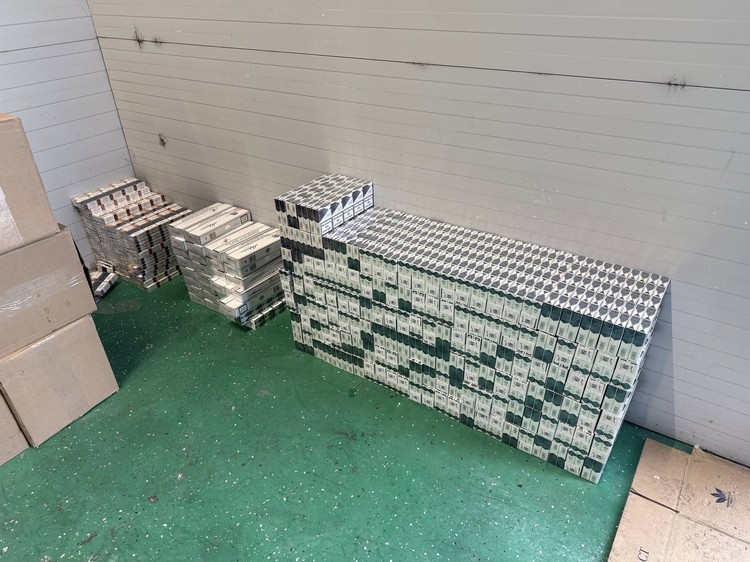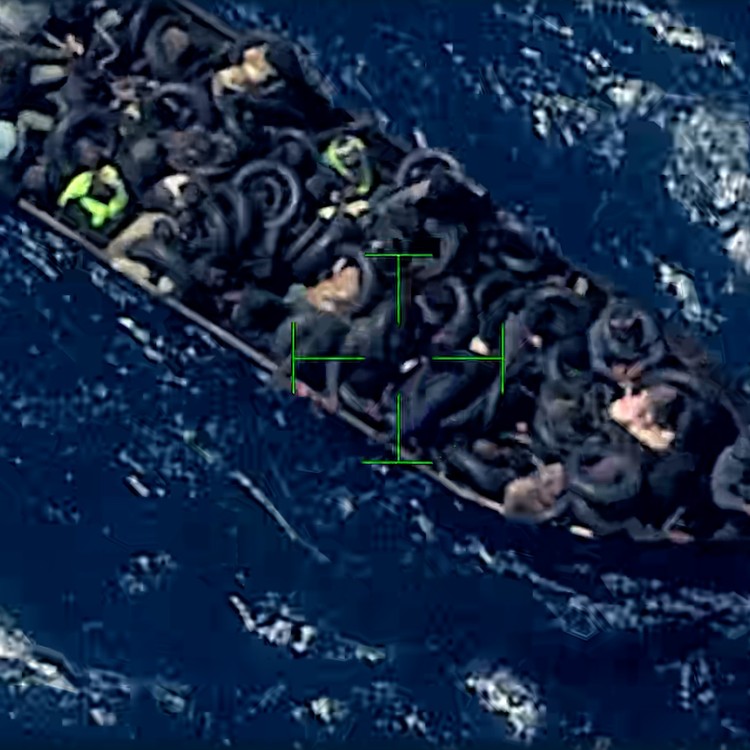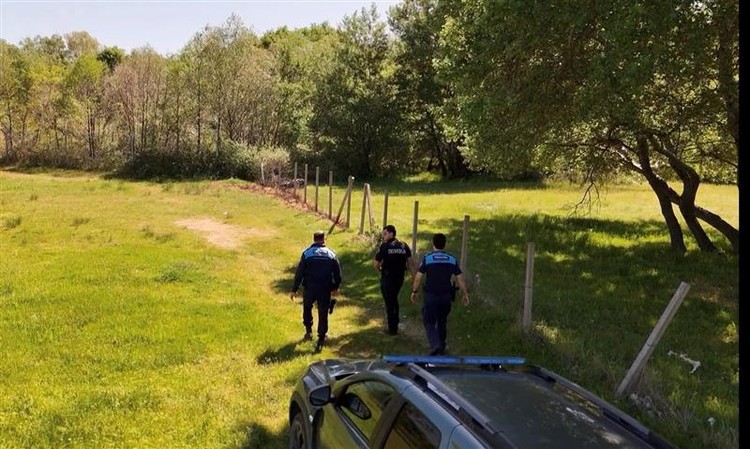In April 2025, Frontex, the European Border and Coast Guard Agency, demonstrated its broad commitment to keeping Europe’s borders secure through a range of impactful operations and collaborations. From cracking down on smugglers in Eastern Europe to saving lives at sea in the Mediterranean, and from embracing new border technologies to strengthening partnerships across the continent, the month showcased Frontex’s dedication to a safer and more cooperative Europe. The following highlights recap how Frontex and national authorities worked hand-in-hand over the past month, underscoring a professional and proactive approach to European border management.
News
Last Month in the Field – April 2025
2025-05-13
Counterfeit Crackdown: Fake Fashion Seized at Bulgaria–Turkey Border
Bulgarian authorities and Frontex scored a victory against cross-border crime this month by stopping a haul of counterfeit goods at the Lesovo border crossing with Turkey. In a joint operation, the Bulgarian Border Police and Customs officers, supported by Frontex Standing Corps officers, intercepted two vehicles loaded with fake designer clothing and footwear. More than 1,400 garments and 900 pairs of shoes bearing logos of famous brands were seized – items that would have been worth an estimated €70,000 on the black market had they slipped through. Some illicit products even carried price tags up to €600 for a single T-shirt, a sign of how convincing the fakes appeared.
This success at the EU’s external border was a direct result of vigilant cooperation. As one Frontex officer put it, “It is not easy to tell a fake from an original when it comes to counterfeit goods. But working together with professionals every day, we have become a serious obstacle for smugglers.” The operation highlighted the excellent partnership between Frontex and the Bulgarian authorities in protecting EU consumers and legitimate businesses. The Frontex officer’s praise for his Bulgarian colleagues underscores the fruitful cooperation on the ground. The confiscated counterfeit items will now be used as evidence, preventing them from entering EU markets, while the perpetrators face legal consequences. This case sends a clear message: through close collaboration, border agencies are effectively shutting down smuggling routes for fake goods.
Smugglers Stumped: 2.6 Million Illegal Cigarettes Seized in Romania
Another major enforcement success in April took place on the Romania–Ukraine border, where a joint team from the Romanian Border Police, Romanian Customs, and Frontex thwarted a large-scale cigarette smuggling attempt. In under an hour, officers apprehended two individuals attempting to illegally bring over 2.6 million cigarettes into the EU. The smugglers had gone to great lengths to hide their contraband, using some truly creative compartments to try to evade detection. The team’s discovery was all the more impressive given the inventive hiding places employed, including:
Modified vehicle parts: Packs of cigarettes were ingeniously concealed inside a fake exhaust pipe of a car, a place rarely suspected in smuggling.
Hidden among goods: Additional cigarettes were stashed within stacks of insulation material, carefully camouflaged to blend in with legitimate cargo.
Thanks to the sharp eyes and expertise of the border guards, these concealments were uncovered before the illicit cargo could move further into Europe. The Frontex officer supporting the operation – known among colleagues as a veteran in fighting smuggling – played a key role in detecting the contraband. Romanian officials and Frontex supervisors alike praised the operation’s success. One colleague lauded the involved officer as “a true professional with a special and inexhaustible flair for detecting cross-border crime.” This compliment underscores the high level of skill present in such joint teams. The “hats off” accolades went to all Romanian and Frontex personnel involved, highlighting how teamwork and shared intelligence can foil even the most elaborate smuggling schemes. The seizure of 2.6 million cigarettes not only represents a financial blow to organised crime but also protects EU markets and taxpayers from the illegal tobacco trade. It stands as yet another example of effective Frontex support at EU borders, keeping illicit goods out of circulation.

Central Med Challenges: EU Solidarity Saves Lives at Sea
As warmer spring weather set in, April saw a surge in irregular migration across the Central Mediterranean, testing the readiness and solidarity of EU border forces. Within just a few days, over 1,100 migrants had arrived on Italian shores, many taking to the sea in flimsy boats launched from North Africa. This sudden influx – more than one thousand people in a 72-hour span – put considerable strain on Italy’s reception facilities and underscored the ongoing challenges in this maritime corridor. In response, Frontex and several EU Member States mobilised swiftly to ensure lives were protected and borders monitored.
European solidarity was on full display during these rescues. Danish and Lithuanian patrol boats deployed under Frontex’s coordination helped the Italian authorities save nearly 400 people from five small, unseaworthy vessels in the central Mediterranean. Operating under Italy’s lead, the crews from Denmark and Lithuania worked tirelessly to transfer men, women, and children from overcrowded, unsafe boats to the relative safety of EU vessels. At the same time, Frontex aerial surveillance teams intensified patrol flights over the sea. Frontex aircraft spotted multiple migrant boats in distress from the air, relaying precise coordinates to rescue units. This early detection enabled timely life-saving interventions by the Italian Coast Guard and other assets, preventing potential tragedies at sea.
Over the course of three days, dozens of rescue operations were carried out by a combination of national and Frontex-deployed resources. Such joint efforts demonstrate the value of a truly integrated European approach: Member States lending support to one another via Frontex when migratory pressure spikes in a particular region. The Executive Director of Frontex noted that every person saved is a testament to the collective commitment of the EU to protect lives. While the Central Mediterranean route remains difficult and dangerous, April’s experience showed how coordinated action can meet these challenges. By pooling vessels, aircraft, and expertise from across Europe, Frontex and its partners helped ensure that a surge in crossings did not turn into a humanitarian disaster. The Agency continues to work closely with Italy and other front-line states, not only to manage irregular migration flows but also to go after the criminal networks exploiting vulnerable migrants. Saving lives at sea remains at the core of Frontex’s mission, alongside securing the EU’s external borders.

Digital Integration: Frontex Links with Cyprus’ Border Database
In April, Frontex achieved a significant milestone in enhancing border security technology and cooperation. Thanks to a new agreement with Cyprus, Frontex officers now have direct access to Cyprus’s national border database at crossing points. This development means that Frontex personnel deployed in support of Cypriot authorities can instantly check traveler information and other border data just as national officers do. The immediate benefits of this integration are clear, leading to:
Quicker decisions at the border, as joint teams can retrieve and verify passenger data in real time.
Stronger support for Cypriot authorities, with Frontex officers able to contribute more effectively during border checks and investigations.
Faster, more secure screening at airports and other entry points, reducing wait times for travelers while enhancing security through better information sharing.
By plugging into Cyprus’s databases, Frontex can help close information gaps and streamline operations on the ground. This is one of the first practical outcomes of a broader initiative to improve data-driven border management. Importantly, preparations are underway for the full rollout of Frontex’s access to the Schengen Information System (SIS) – Europe’s largest security database – which will take cooperation to the next level in the near future. Gaining SIS access will enable Frontex officers to spot persons or objects of interest (such as stolen documents or wanted individuals) across all of Europe’s borders in real time, greatly amplifying their effectiveness.
This deepening tech integration with Member States exemplifies Frontex’s push for “smart borders.” It shows how investing in modern IT solutions can make border control both faster and more secure, without compromising on thoroughness. Cypriot authorities have welcomed Frontex’s connectivity to their systems, noting that it serves as a force multiplier for national border guards. Together, Frontex and Cyprus are building a border management approach that is fast, fair, and future-ready – one that leverages the best of technology and teamwork to protect the EU’s external frontiers.
Anniversary Milestone: Two Years of Frontex–North Macedonia Cooperation
This month marked two years since the launch of the joint operation between Frontex and North Macedonia, a partnership that has significantly bolstered border security in the Western Balkans. In April 2023, North Macedonia became the first Western Balkan country to host Frontex border teams under a special status agreement, and two years on, the results of this cooperation are evident and worth celebrating. Frontex Standing Corps officers have been working side by side with North Macedonian Border Police along the country’s borders, sharing expertise and helping to manage migratory movements and security threats in the region. Together, over the past 24 months, they have achieved several important milestones in border management, including:
Joint patrols conducted along North Macedonia’s borders with neighbouring countries, enhancing surveillance and the ability to intercept irregular crossings or illicit activities. These mixed teams have increased the visibility and reach of border control, acting as a deterrent to smugglers and traffickers.
Delivery of modern equipment and technical assets to North Macedonia’s authorities. Frontex has provided patrol vehicles, document inspection devices, and other specialist tools to strengthen the country’s border infrastructure. This upgraded equipment means local border guards are better equipped to spot fake documents, hidden contraband, or unauthorised entries.
Stronger overall border protection for North Macedonia and Europe. By reinforcing a key section of the Balkan migration route, the cooperation has contributed to greater security for the entire EU external border. It has helped manage migration flows more effectively and cracked down on cross-border crime, from migrant smuggling to contraband trafficking, benefitting all Europeans.
Frontex and North Macedonia’s officials commemorated the two-year anniversary by reflecting on these successes and looking ahead to continued collaboration. The presence of European border guards in North Macedonia underscores the EU’s commitment to working with its neighbours to tackle shared challenges. It also provides invaluable experience to all the officers involved, creating a spirit of camaraderie and mutual understanding. According to Frontex’s leadership, this partnership is a model of EU–Western Balkans cooperation, showing how aligning procedures and sharing resources can lead to concrete improvements in security and border management. As the operation enters its third year, Frontex plans to maintain its support, including further training for North Macedonia’s officers and ongoing joint patrols, thereby maintaining the positive momentum. The past two years have laid a solid foundation for even closer ties and a more secure region in the future.

High-Level Maritime Security Talks in Greece: Portugal and Frontex Deepen Ties
Frontex’s activities in April were not limited to field operations – they also extended to strategic dialogue at the highest levels. A noteworthy event took place at the Frontex Operational Headquarters in Piraeus, Greece, where Commander Georgios Pyliaros (the Frontex Field Commander in Greece) hosted a high-level meeting with Admiral José António Vizinha Mirones, the Commander of the Portuguese Maritime Police. Admiral Mirones visited the Piraeus headquarters as part of a Joint Coordination Board discussion, focusing on the current operational situation and challenges in the Eastern Mediterranean, particularly regarding migration flows affecting Greece and Cyprus.
During this visit, both leaders exchanged insights on maritime border security and reinforced their commitment to close cooperation. Commander Pyliaros expressed, on behalf of Frontex’s chain of command, sincere appreciation for Portugal’s continued contribution to Frontex-led operations. He highlighted the professionalism and dedication displayed by the Portuguese crews operating coastal patrol vessels in Greek waters. These Portuguese Maritime Police teams, deployed under Frontex, have been instrumental in joint patrols and search-and-rescue missions in the Aegean Sea, and their exemplary performance and seamless integration with Frontex units have not gone unnoticed. Admiral Mirones, for his part, conveyed gratitude for the opportunity to visit and engage with Frontex’s Greece office. He commended the collective effort being made to safeguard Europe’s maritime borders and stressed the importance of ongoing collaboration. Both officials agreed that maintaining strong partnerships – such as the one between Frontex and Portugal – is crucial in addressing migration and security challenges at sea.
The meeting concluded on a highly positive note, symbolising the unity of purpose among European border and coast guard services. In a ceremonial gesture, commemorative coins were exchanged between Frontex and the Portuguese Maritime Police, underscoring mutual respect and teamwork. This high-level maritime dialogue not only strengthened bilateral ties but also provided strategic guidance for field operations. With Portugal’s vessels and crews continuing to serve in Frontex missions, such coordination ensures that everyone is rowing in the same direction. The result is a more effective response to irregular migration by sea and a safer maritime environment for all. These talks in April set the stage for even more synchronised efforts in the months to come, reaffirming that European partners stand stronger together in protecting the EU’s external borders.

Targeting Arms Smuggling: EU Officers Train in Poland under EMPACT
Frontex also invested in long-term security capacity this month by focusing on the fight against illicit firearms. Firearms trafficking is a growing threat to EU internal security, especially in times of war and instability when weapons can more easily find their way onto the black market. In April, within the framework of the EU’s EMPACT initiative (European Multidisciplinary Platform Against Criminal Threats), Frontex led a specialised training programme in Poland aimed at sharpening the skills of border guards in intercepting illegal arms. The training was hosted at the Polish Border Guard Academy in Kętrzyn – a centre known for advanced law enforcement training – and brought together officers from 10 EU Member States. These participants, all of them frontline border or customs officers, underwent intensive instruction on how to better detect and stop the smuggling of firearms at EU borders.
Over the course of the training, the multinational group of officers learned about concealment methods and detection techniques for firearms. Experts shared real-case examples of smugglers attempting to hide weapons and ammunition in vehicles, cargo, or personal luggage, highlighting red flags to watch for. The trainees practiced using x-ray scanners, metal detectors, and other tools to identify weapons hidden in creative ways. They also exchanged intelligence on smuggling routes and the latest trends in gun trafficking, recognising that traffickers are constantly adapting their methods. By simulating realistic scenarios, the course enabled officers to hone their decision-making under pressure – for instance, when discovering a hidden handgun during a routine vehicle inspection at a border crossing. The overarching goal was to equip frontline officers with the knowledge, tools, and confidence to intercept firearms before those weapons can reach our streets and communities.
This EMPACT-supported training in Poland is part of a broader EU effort to cut off the supply of illegal firearms that can fuel organised crime or even terrorism. By investing in people and skills, Frontex and its partners are strengthening a critical line of defence against gun trafficking. The officers who completed the course in Kętrzyn will take their enhanced expertise back to their home countries – from Scandinavia to Southern Europe – multiplying the impact. They form a network of trained specialists who can also share best practices with colleagues, thus raising overall capacity across the EU. Frontex officials highlighted that such cooperative training not only improves technical know-how but also builds trust and communication channels among European border agencies. Ultimately, this means better coordinated operations and information-sharing when it comes to stopping dangerous weapons from crossing into the EU. The training concluded with participants and instructors affirming their commitment to stay one step ahead of firearms traffickers. As new security challenges emerge, continuous professional development like this ensures that Europe’s border guards remain vigilant and prepared.
Looking Ahead
April 2025 showcased the full spectrum of Frontex’s mission – from frontline enforcement and lifesaving rescues to technological advancement and international partnership. As Europe’s external border challenges continue to evolve with the changing seasons and geopolitical context, Frontex is moving ahead with resolve. The Agency is leveraging the momentum from April’s successes to further strengthen cooperation, whether by expanding joint operations in partner countries or by welcoming more contributions from Member States. It is accelerating the adoption of modern technology and information systems to give border guards an edge in both speed and accuracy. Equally, Frontex remains committed to investing in its people – through training, leadership development, and a culture of shared expertise – recognising that a well-prepared human element is key to any high-tech solution. In the coming months, Frontex will continue to stand shoulder-to-shoulder with EU countries at their borders, upholding European values of security and solidarity. By building on the foundations laid in April, the European Border and Coast Guard will be even better equipped to tackle whatever challenges the future holds – protecting the EU’s borders and the people who depend on them, with professionalism, compassion, and unity.